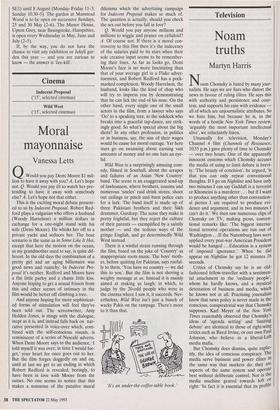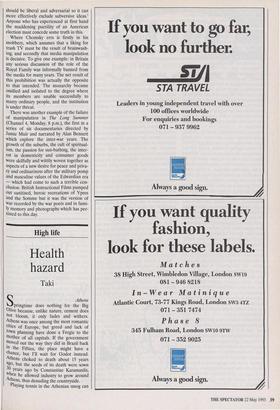Television
Noam truths
Martyn Harris
Noam Chomsky is hated by many jour- nalists. He says we are liars who distort the news in favour of ruling elites. He says this with authority and persistence and cour- tesy, and supports his case with evidence all of which are unjournalistic attributes. So we hate him, but because he is, in the words of a hostile New York Times review, `arguably the most important intellectual alive', we reluctantly listen.
Unusually for television, Monday's Channel 4 film (Channels of Resistance, 10.55 p.m.) gave plenty of time to Chomsky — over two hours. One of the apparently innocent customs which Chomsky accuses the media of using to limit debate is brevi- ty. 'The beauty of concision', he argued, 'is that you can only repeat conventional thoughts. If I go on Nightline and have only two minutes I can say Gaddafi is a terrorist or Khomeini is a murderer . . . but if I want to produce anything other than convention- al pieties I am required to produce evi- dence and argument, and in two minutes I can't do it.' We then saw numerous clips of Chomsky on TV, making pious, conven- tional remarks like: 'The biggest interna- tional terrorist operations are run out of Washington ...If the Nuremburg laws were applied every post-war American President would be hanged ... Education is a system of imposed ignorance.' When he did appear on Nightline he got 12 minutes 16 seconds.
Critics of Chomsky say he is an old- fashioned fellow-traveller with a sentimen- tal attachment to the 'ordinary people', whom he hardly knows, and a mystical detestation of business and media, which he knows not at all. Practising journalists know that news policy is never made in the conscious, conspiratorial way that Chomsky supposes. Karl Meyer of the New York Times reasonably observed that ChornskY's ideas of 'agenda setting' and 'limiting debate' are identical to those of right-wing critics such as Reed Irvine, or our own Fan]. Johnson, who believe in a liberal-Left media mafia.
But Chomsky does dismiss, quite explic- itly, the idea of conscious conspiracy. The media serve business and power elites to the same way that markets do: they are aspects of the same system and operate best without deliberate control. Nor is the media machine geared towards left or right: 'In fact it is essential that its profile
should be liberal and adversarial so it can more effectively exclude subversive ideas.' Anyone who has experienced at first hand the maddening puerility of an American election must concede some truth in this.
Where Chomsky errs is firstly in his snobbery, which assumes that a liking for trash TV must be the result of brainwash- ing, and secondly that media manipulation is decisive. To give one example: in Britain any serious discussion of the role of the Royal Family was informally banned from the media for many years. The net result of this prohibition was actually the opposite to that intended. The monarchy became ossified and isolated to the degree where its members are unable successfully to marry ordinary people, and the institution is under threat.
There was another example of the failure of manipulation in The Long Summer (Channel 4, Monday, 8 p.m.), the first in a series of six documentaries directed by Jamie Muir and narrated by Alan Bennett which explore the inter-war years. The growth of the suburbs, the cult of spiritual- ism, the passion for sun-bathing, the inter- est in domesticity and consumer goods were skilfully and wittily woven together as aspects of a new desire for peace and priva- cy and ordinariness after the military pomp and masculine values of the Edwardian era — which had come to such a terrible con- clusion. British Instructional Films pumped out sanitised, heroic recreations of Ypres and the Somme but it was the version of war recorded by the war poets and in fami- ly memory and photographs which has per- sisted to this day.



















































 Previous page
Previous page